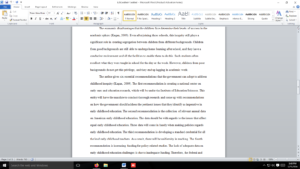American Early Childhood Education
Question Description: Review Kagan’s article “American Early Childhood Education: Preventing or Perpetuating Inequity?,” and note the six early childhood inequities the author presents. They range from the kinds of inequity that affect young children even before they get to preschool, to inequity in the infrastructure that supports early childhood education. Then take particular note of the six specific policy recommendations meant to lead toward a more equitable, high-quality early childhood system.
Choose one of the inequities in which you are most interested.
Then, analyze each of the six policy recommendations, and determine in what way(s) any or all might help alleviate or eradicate the inequity you chose.
For this assignment submit:
A brief description of the inequity on which you decided to focus
A summary of each of the six policy recommendations
An evaluation, based on what you have learned so far, of the ways in which any of the six recommendations does/does not help reduce/eradicate the selected inequity
A summarizing paragraph reflecting on any insight(s) you gained about the inequity on which you chose to focus
An assessment of ways your current understanding of issues related to equity in early childhood education has broadened and deepened and how this new knowledge and awareness might influence your work with young children and families and capacity to influence positive social change.
Answer previewThe economic disadvantages that the children face determine their levels of success in the academic sphere (Kagan, 2009). Even after joining these schools, this inequity still plays a significant role in creating segregation between children from different backgrounds. Children from good backgrounds are still able to undergo home learning after school, and they have a conducive environment and all the facilities to enable them to do this. Such students often recollect what they were taught in school for the day or the week. However, children from poor backgrounds do not get this privilege, and they end up lagging in academic work.
The author gives six essential recommendations that the government can adopt to address childhood inequity (Kagan, 2009). The first recommendation is creating a national center on early care and education research, which will be under the Institute of Education Sciences. This entity will have the mandate to conduct thorough research and come up with recommendations on how the government should address the pertinent issues that they identify as imperative in early childhood education.
[763 Words]

American Early Childhood Education

